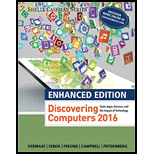
Enhanced Discovering Computers 2017 (Shelly Cashman Series) (MindTap Course List)
1st Edition
ISBN: 9781305657458
Author: Misty E. Vermaat, Susan L. Sebok, Steven M. Freund, Mark Frydenberg, Jennifer T. Campbell
Publisher: Cengage Learning
expand_more
expand_more
format_list_bulleted
Concept explainers
Question
Chapter 11, Problem 11CT
Program Plan Intro
Big Data:
- Big data is defined as large scale data set that requires more advanced technologies in order to store, access and retrieve the data.
- Users can access any type of data from large data sets.
- Big data supports the following types of data
- Structured data: Data can be stored, accessed by the defined rules or formats like relational tables. This is known as structured data.
- Unstructured data: Heterogeneous data like combination of text files, image files and video files are difficult to access. This type of data is known as unstructured data.
- Semi-structured data: It is a combination of both structured and unstructured data. Example: Extended Markup Language (XML) file.
Expert Solution & Answer
Want to see the full answer?
Check out a sample textbook solution
Students have asked these similar questions
D. S. Malik, Data Structures Using C++, 2nd Edition, 2010
Methods (Ch6) - Review
1. (The MyRoot method) Below is a manual implementation of the Math.sqrt() method in Java.
There are two methods, method #1 which calculates the square root for positive integers, and
method #2, which calculates the square root of positive doubles (also works for integers).
public class SquareRoot {
public static void main(String[] args) {
}
// implement a loop of your choice here
// Method that calculates the square root of integer variables
public static double myRoot(int number) {
double root;
root=number/2;
double root old;
do {
root old root;
root (root_old+number/root_old)/2;
} while (Math.abs(root_old-root)>1.8E-6);
return root;
}
// Method that calculates the square root of double variables
public static double myRoot(double number) {
double root;
root number/2;
double root_old;
do {
root old root;
root (root_old+number/root_old)/2;
while (Math.abs (root_old-root)>1.0E-6);
return root;
}
}
Program-it-Yourself: In the main method, create a program that…
I would like to know the main features about the following 3 key concepts:1. Backup Domain Controller (BDC)2. Access Control List (ACL)3. Dynamic Memory
Chapter 11 Solutions
Enhanced Discovering Computers 2017 (Shelly Cashman Series) (MindTap Course List)
Ch. 11 - Define the terms, database and database software....Ch. 11 - Prob. 2SGCh. 11 - Prob. 3SGCh. 11 - Prob. 4SGCh. 11 - Prob. 5SGCh. 11 - Explain how a DBMS might manage deleted or...Ch. 11 - Prob. 7SGCh. 11 - Prob. 8SGCh. 11 - Prob. 9SGCh. 11 - Prob. 10SG
Ch. 11 - Prob. 11SGCh. 11 - Prob. 12SGCh. 11 - Prob. 13SGCh. 11 - Prob. 14SGCh. 11 - Prob. 15SGCh. 11 - Prob. 16SGCh. 11 - Prob. 17SGCh. 11 - A(n) _____ is a request for specific information...Ch. 11 - Prob. 19SGCh. 11 - Prob. 20SGCh. 11 - Prob. 21SGCh. 11 - Prob. 22SGCh. 11 - Prob. 23SGCh. 11 - Prob. 24SGCh. 11 - Prob. 25SGCh. 11 - Prob. 26SGCh. 11 - Prob. 27SGCh. 11 - Prob. 28SGCh. 11 - Prob. 29SGCh. 11 - Prob. 30SGCh. 11 - Prob. 31SGCh. 11 - Prob. 32SGCh. 11 - Prob. 33SGCh. 11 - Prob. 34SGCh. 11 - Prob. 35SGCh. 11 - Prob. 36SGCh. 11 - Prob. 37SGCh. 11 - Prob. 38SGCh. 11 - Prob. 39SGCh. 11 - Prob. 40SGCh. 11 - Prob. 41SGCh. 11 - Prob. 42SGCh. 11 - Prob. 43SGCh. 11 - Define the following terms: programming language,...Ch. 11 - Prob. 45SGCh. 11 - Define the terms, procedural language, compiler,...Ch. 11 - Prob. 47SGCh. 11 - Prob. 48SGCh. 11 - Prob. 49SGCh. 11 - Prob. 1TFCh. 11 - Prob. 2TFCh. 11 - Prob. 3TFCh. 11 - Prob. 4TFCh. 11 - Prob. 5TFCh. 11 - Prob. 6TFCh. 11 - Prob. 7TFCh. 11 - Prob. 8TFCh. 11 - One way to secure a database is to allow only...Ch. 11 - In a rollforward, the DBMS uses the log to undo...Ch. 11 - Prob. 11TFCh. 11 - Prob. 12TFCh. 11 - Prob. 1MCCh. 11 - Prob. 2MCCh. 11 - Prob. 3MCCh. 11 - Prob. 4MCCh. 11 - Prob. 5MCCh. 11 - Prob. 6MCCh. 11 - _____ feasibility measures whether an organization...Ch. 11 - Prob. 8MCCh. 11 - Prob. 1MCh. 11 - Prob. 2MCh. 11 - Prob. 3MCh. 11 - Prob. 4MCh. 11 - Prob. 5MCh. 11 - Prob. 6MCh. 11 - Prob. 7MCh. 11 - Prob. 8MCh. 11 - Prob. 9MCh. 11 - Prob. 10MCh. 11 - Prob. 2CTCh. 11 - Prob. 3CTCh. 11 - What is function creep?Ch. 11 - Prob. 5CTCh. 11 - Prob. 6CTCh. 11 - Prob. 7CTCh. 11 - Prob. 8CTCh. 11 - Prob. 9CTCh. 11 - Prob. 10CTCh. 11 - Prob. 11CTCh. 11 - Prob. 12CTCh. 11 - Prob. 13CTCh. 11 - Prob. 14CTCh. 11 - Prob. 15CTCh. 11 - Prob. 16CTCh. 11 - Prob. 17CTCh. 11 - Prob. 18CTCh. 11 - Prob. 19CTCh. 11 - Prob. 20CTCh. 11 - Prob. 21CTCh. 11 - Prob. 22CTCh. 11 - Prob. 23CTCh. 11 - Prob. 24CTCh. 11 - Prob. 25CTCh. 11 - Prob. 26CTCh. 11 - Prob. 27CTCh. 11 - Prob. 28CTCh. 11 - Prob. 1PSCh. 11 - Prob. 2PSCh. 11 - Prob. 3PSCh. 11 - Prob. 4PSCh. 11 - Prob. 5PSCh. 11 - Prob. 6PSCh. 11 - Prob. 7PSCh. 11 - Prob. 8PSCh. 11 - Database Recovery Your boss has informed you that...Ch. 11 - Prob. 10PSCh. 11 - Prob. 11PSCh. 11 - Prob. 1.1ECh. 11 - Prob. 1.2ECh. 11 - Prob. 1.3ECh. 11 - Prob. 2.1ECh. 11 - Prob. 2.2ECh. 11 - Prob. 2.3ECh. 11 - Prob. 3.1ECh. 11 - Prob. 3.2ECh. 11 - Prob. 3.3ECh. 11 - Prob. 4.1E
Knowledge Booster
Learn more about
Need a deep-dive on the concept behind this application? Look no further. Learn more about this topic, computer-science and related others by exploring similar questions and additional content below.Similar questions
- In cell C21, enter a formula to calculate the number of miles you expect to drive each month. Divide the value of number of miles (cell A5 from the Data sheet) by the average MPG for the vehicle multiplied by the price of a gallon of gas (cell A6 from the Data sheet).arrow_forwardMicrosoft Excelarrow_forwardIn cell C16, enter a formula to calculate the price of the vehicle minus your available cash (from cell A3 in the Data worksheet). Use absolute references where appropriate—you will be copying this formula across the row what fomula would i use and how do i solve itarrow_forward
- What types of data visualizations or tools based on data visualizations have you used professionally, whether in a current or past position? What types of data did they involve? What, in your experience, is the value these data views or tools added to your performance or productivity?arrow_forwardQuestion: Finding the smallest element and its row index and column index in 2D Array: 1. Write a public Java class min2D. 2. In min2D, write a main method. 3. In the main method, create a 2-D array myArray with 2 rows and 5 columns: {{10, 21, 20, 13, 1}, {2, 6, 7, 8, 14}}. 4. Then, use a nested for loop to find the smallest element and its row index and column index. 5. Print the smallest element and its row index and column index on Java Consolearrow_forward(using R)The iris data set in R gives the measurements in centimeters of the variables sepal length and width andpetal length and width, respectively, for 50 flowers from each of 3 species of iris, setosa, versicolor, andvirginica. Use the iris data set and the t.test function, test if the mean of pepal length of iris flowers isgreater than the mean of sepal length.The iris data set in R gives the measurements in centimeters of the variables sepal length and width andpetal length and width, respectively, for 50 flowers from each of 3 species of iris, setosa, versicolor, andvirginica. Use the iris data set and the t.test function, test if the mean of pepal length of iris flowers isgreater than the mean of sepal length.arrow_forward
- Recognizing the Use of Steganography in Forensic Evidence (4e)Digital Forensics, Investigation, and Response, Fourth Edition - Lab 02arrow_forwardWrite a Java Program to manage student information of a university. The Javaprogram does the following steps:a) The program must use single-dimensional arrays to store the studentinformation such as Student ID, Name and Major.b) The program asks the user to provide the number of students.c) The program asks the user to enter the Student IDs for the number of studentsand stores them.d) The program asks the user to enter the corresponding names for the numberof students and stores them.e) The program then asks the user to provide the corresponding major for thestudents and stores them.f) The program then should display the following options:1. ID Search2. Major Enrollment3. Exitg) On selecting option 1, the user can search for a student using Student ID. Theprogram asks the user to enter a Student ID. It then should print thecorresponding student’s details such as Name and Major if the user providedStudent ID number is present in the stored data. If the user’s Student IDnumber does not…arrow_forward(a) Algebraically determine the output state |q3q2q1q0> (which is a 4-qubitvector in 16-dimensional Hilbert space). Show all steps of your calculations. (b) Run a Qiskit code which implements the circuit and append threemeasurement gates to measure the (partial) output state |q2q1q0> (which is a 3-qubit vector in 8-dimensional Hilbert space). this is for quantum soft dev class, you can use stuff like Deutsch Jozsa if u wantarrow_forward
- Write a C++ program that will count from 1 to 10 by 1. The default output should be 1, 2, 3, 4, 5, 6 , 7, 8, 9, 10 There should be only a newline after the last number. Each number except the last should be followed by a comma and a space. To make your program more functional, you should parse command line arguments and change behavior based on their values. Argument Parameter Action -f, --first yes, an integer Change place you start counting -l, --last yes, an integer Change place you end counting -s, --skip optional, an integer, 1 if not specified Change the amount you add to the counter each iteration -h, --help none Print a help message including these instructions. -j, --joke none Tell a number based joke. So, if your program is called counter counter -f 10 --last 4 --skip 2 should produce 10, 8, 6, 4 Please use the last supplied argument. If your code is called counter, counter -f 4 -f 5 -f 6 should count from 6. You should count from first to last inclusively.…arrow_forwardWrite a program that will count from 1 to 10 by 1. The default output should be 1, 2, 3, 4, 5, 6 , 7, 8, 9, 10 There should be only a newline after the last number. Each number except the last should be followed by a comma and a space. To make your program more functional, you should parse command line arguments and change behavior based on their values. Argument Parameter Action -f, --first yes, an integer Change place you start counting -l, --last yes, an integer Change place you end counting -s, --skip optional, an integer, 1 if not specified Change the amount you add to the counter each iteration -h, --help none Print a help message including these instructions. -j, --joke none Tell a number based joke. So, if your program is called counter counter -f 10 --last 4 --skip 2 should produce 10, 8, 6, 4 Please use the last supplied argument. If your code is called counter, counter -f 4 -f 5 -f 6 should count from 6. You should count from first to last inclusively. You…arrow_forwardWas What is the deference betwem full At Adber and Hold?arrow_forward
arrow_back_ios
SEE MORE QUESTIONS
arrow_forward_ios
Recommended textbooks for you
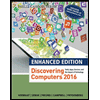 Enhanced Discovering Computers 2017 (Shelly Cashm...Computer ScienceISBN:9781305657458Author:Misty E. Vermaat, Susan L. Sebok, Steven M. Freund, Mark Frydenberg, Jennifer T. CampbellPublisher:Cengage Learning
Enhanced Discovering Computers 2017 (Shelly Cashm...Computer ScienceISBN:9781305657458Author:Misty E. Vermaat, Susan L. Sebok, Steven M. Freund, Mark Frydenberg, Jennifer T. CampbellPublisher:Cengage Learning Principles of Information Systems (MindTap Course...Computer ScienceISBN:9781305971776Author:Ralph Stair, George ReynoldsPublisher:Cengage Learning
Principles of Information Systems (MindTap Course...Computer ScienceISBN:9781305971776Author:Ralph Stair, George ReynoldsPublisher:Cengage Learning Fundamentals of Information SystemsComputer ScienceISBN:9781337097536Author:Ralph Stair, George ReynoldsPublisher:Cengage Learning
Fundamentals of Information SystemsComputer ScienceISBN:9781337097536Author:Ralph Stair, George ReynoldsPublisher:Cengage Learning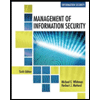 Management Of Information SecurityComputer ScienceISBN:9781337405713Author:WHITMAN, Michael.Publisher:Cengage Learning,
Management Of Information SecurityComputer ScienceISBN:9781337405713Author:WHITMAN, Michael.Publisher:Cengage Learning,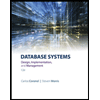 Database Systems: Design, Implementation, & Manag...Computer ScienceISBN:9781305627482Author:Carlos Coronel, Steven MorrisPublisher:Cengage Learning
Database Systems: Design, Implementation, & Manag...Computer ScienceISBN:9781305627482Author:Carlos Coronel, Steven MorrisPublisher:Cengage Learning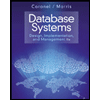 Database Systems: Design, Implementation, & Manag...Computer ScienceISBN:9781285196145Author:Steven, Steven Morris, Carlos Coronel, Carlos, Coronel, Carlos; Morris, Carlos Coronel and Steven Morris, Carlos Coronel; Steven Morris, Steven Morris; Carlos CoronelPublisher:Cengage Learning
Database Systems: Design, Implementation, & Manag...Computer ScienceISBN:9781285196145Author:Steven, Steven Morris, Carlos Coronel, Carlos, Coronel, Carlos; Morris, Carlos Coronel and Steven Morris, Carlos Coronel; Steven Morris, Steven Morris; Carlos CoronelPublisher:Cengage Learning

Enhanced Discovering Computers 2017 (Shelly Cashm...
Computer Science
ISBN:9781305657458
Author:Misty E. Vermaat, Susan L. Sebok, Steven M. Freund, Mark Frydenberg, Jennifer T. Campbell
Publisher:Cengage Learning

Principles of Information Systems (MindTap Course...
Computer Science
ISBN:9781305971776
Author:Ralph Stair, George Reynolds
Publisher:Cengage Learning

Fundamentals of Information Systems
Computer Science
ISBN:9781337097536
Author:Ralph Stair, George Reynolds
Publisher:Cengage Learning

Management Of Information Security
Computer Science
ISBN:9781337405713
Author:WHITMAN, Michael.
Publisher:Cengage Learning,

Database Systems: Design, Implementation, & Manag...
Computer Science
ISBN:9781305627482
Author:Carlos Coronel, Steven Morris
Publisher:Cengage Learning

Database Systems: Design, Implementation, & Manag...
Computer Science
ISBN:9781285196145
Author:Steven, Steven Morris, Carlos Coronel, Carlos, Coronel, Carlos; Morris, Carlos Coronel and Steven Morris, Carlos Coronel; Steven Morris, Steven Morris; Carlos Coronel
Publisher:Cengage Learning